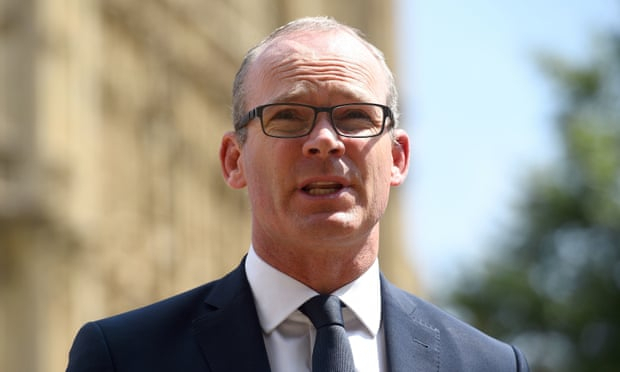Theresa May will address EU leaders in Brussels before dinner on Wednesday night as negotiators continue to grapple with the drafting of the withdrawal agreement.
However, a No 10 source said there was no change to the UK’s approach to the transition period, which is scheduled to end in December 2020. “We are not calling for an extension to the implementation period,” the source said.
The UK is pushing for the Irish backstop proposal to be replaced in the withdrawal agreement by a temporary UK-wide customs union, insisting it cannot allow Northern Ireland to be “carved off”.
The EU27 has insisted there must be unique “all-weather” insurance protections to avoid any hard border in Northern Ireland, and point to the wording of the December joint agreement that the backstop must operate “unless and until” alternative arrangements to prevent a hard border have been put in place.
Before the summit, Ireland’s foreign minister, Simon Coveney, said the EU was willing to offer “new thinking and imagination” to try to close the gap but said the UK could not go back on existing commitments.
“The EU side is willing to allow more time in the transition period to agree an alternative solution to the backstop,” he told BBC Radio 4’s Today programme. “What [the EU chief negotiator] Michel Barnier is now suggesting is: let’s ensure the backstop is never likely to be used by creating the space and time for the UK and the EU to be able to negotiate UK-wide customs arrangements.”
However, he said, the backstop would not work as an insurance option if it was time-limited. “We do have to insist on the commitments that have already been made in this negotiation process being followed through,” he said.
“This is like if you take out fire insurance on your home … it’s there to reassure people there is a fallback position if all else fails.”
Coveney said EU countries including Ireland had no desire to see the break-up of the United Kingdom, or to impose a customs border down the Irish Sea but said British opponents also had to respect what had already been agreed.
“Nobody is asking that Northern Ireland remain part of the EU,” he said. “But what we are doing is recognising that Northern Ireland is different to other parts of the United Kingdom. A peace agreement for the last 20 years has provided stability and normality on the island of Ireland and an absence of violence, that is what we are trying to protect.
“We have been thrust into this position and we are trying to protect a basic core interest. The majority of people in Northern Ireland support that position, including a sensible de-dramatised backstop to settle nerves on the border issue.”
Coveney said the EU would begin publishing its contingency planning for a no-deal scenario next week, which he described as “not a pretty picture”.
“People need to be mature enough to recognise that,” he said. “There are a lot of inaccurate macho talk about countries being able to survive a no-deal Brexit … the truth is a no deal Brexit creates significant problems.”
Downing Street said May would meet the taoiseach, Leo Varadkar, as well as EU council president, Donald Tusk, and the European commission president, Jean-Claude Juncker, in Brussels on Wednesday afternoon for bilateral talks, before she addresses all of the EU27 leaders pre-dinner. She will not attend the rest of the meal, and will depart for the UK ambassador’s residence as Brexit talks continue among EU leaders over dinner in her absence.
Plans to outline a future trade deal during a leaders’ dinner on Wednesday night, a long-sought demand of Downing Street, have been scrapped.
Barnier, the EU’s chief negotiator, said the UK government had also failed to meet the conditions necessary for a special November Brexit summit to be called, though Coveney suggested on Wednesday morning it was still a possibility.
May received a boost on Wednesday morning in the form of a letter from the US president, Donald Trump, telling Congress that the US wants to start formal trade talks with the UK “as soon as it is ready” after Brexit.
The letter from Trump’s trade representative, Robert Lighthizer, was sent to Orrin Hatch, the chair of the Senate finance committee, House speaker, Paul Ryan, and Democratic House and Senate leaders, Nancy Pelosi and Chuck Schumer, along with similar letters on starting trade talks with Japan and the EU.
“We are committed to concluding these negotiations with timely and substantive results for American workers, farmers, ranchers, and businesses,” Lighthizer said, a hint that the US would expect a wide-ranging deal to cover controversial agriculture products.
The UK international trade secretary, Liam Fox, has said the British public will not accept the diluting of animal welfare standards, though Trump’s commerce secretary, Wilbur Ross, has said a US-UK trade deal hinges on scrapping EU food standards regulations, including on chlorinated chicken.
The Liberal Democrat MP Tom Brake, a supporter of the anti-Brexit Best for Britain campaign, said: “With this letter the American government have fired the starting gun on their chlorine chicken trade deal. British supermarkets could be flooded with chlorine-washed chicken, hormone-treated beef and pork laced with drugs.”
More about: #EU















































